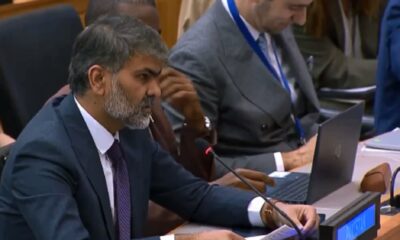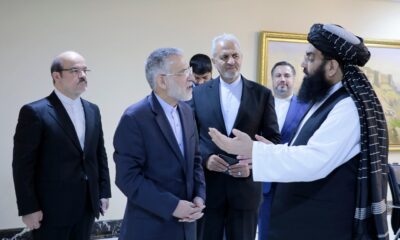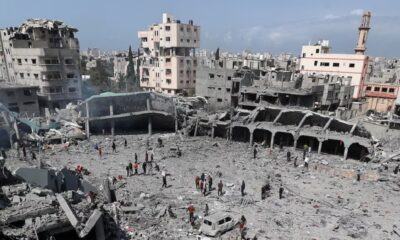Latest News
Afghanistan’s isolation is not the solution, we must be patient and pragmatic: UN envoy

Isolation is not the solution, and the international community must continue to engage to build trust for the benefit of the Afghan people, UN envoy Roza Otunbayeva told the Security Council on Thursday.
“Some say that engagement has not worked because these decisions keep coming despite international condemnation,” Otunbayeva said. “But pressure and condemnation do not seem to be working, and if pursued without forward-leaning, principled engagement, it will lead to Afghanistan’s isolation. Isolation is not the solution, and we must continue to engage to build trust for the benefit of the Afghan people. We must be both patient and pragmatic, while also strong and resolute in our principles.”
She said that the Islamic Emirate has continued to pursue their vision of an Islamic system and their interpretation of Afghan culture, which continues to be characterized by unprecedented restrictions on women and on girls.
She noted that as we are now approaching nearly twelve-hundred days without girls having access to formal education beyond the sixth grade, with women and girls facing a progressive erasure from almost all walks of life.
US envoy Linda Thomas-Greenfield said that IEA’s new restrictions targeting women’s medical training denies logic and could represent a death sentence for Afghan women and girls in dire need of potentially lifesaving medical treatment.
“It will have an impact on every mother, every unborn infant – boys and girls – and on the future of Afghanistan,” she said.
The US diplomat said that Afghan experts, particularly women, must be meaningfully included throughout the Doha Process and its working groups. “We cannot allow the Taliban (IEA) to dictate the terms of these meetings or to exclude Afghan experts,” she said.
Addressing the Afghan women, she said: “We will endeavor to match your resolve by developing creative solutions and concrete initiatives that will provide opportunities for education and employment, while we use all the tools at the Council’s disposal to push the Taliban (IEA) to rescind its discriminatory decrees.”
Russian envoy Vassily Nebenzia expressed concern about the ongoing security risks emanating from the persistent terrorist activity of Daesh.
He said that the Islamic Emirate is making efforts against the group, but they can hardly be described as sufficient to definitely eradicate terrorism.
“We see that the fighters are enhancing their presence in the country and they are deliberately escalating the situation there by recruiting new fighters, including foreign terrorist fighters, and carrying out new terrorist attacks targeting representatives of religious and ethnic minorities, including women and children,” he said.
“Given the amount of weaponry left in the country by the Western military, the threat of these weapons falling into the hands of fighters and subsequently spreading throughout the region and beyond is becoming more and more likely,” he warned.
Chinese envoy Fu Cong said that the international community expects the Islamic Emirate to govern moderately, build an inclusive government, and protect the basic rights and interests of all people.
“We hope that Afghanistan will heed the reasonable concerns of the international community and protect women’s rights to education, employment, and public life,” he said. “At the same time, we should realize that the issue of women’s rights is not the entire problem of Afghanistan, nor is it the main source of the current challenges. It is necessary to support the development and reconstruction of Afghanistan, eliminate the root causes of instability, and create favorable conditions for protecting the rights and interests of all people, including women.”
Ahead of the meeting, IEA’s spokesman Zabihullah Mujahid said that the government should have a representative in such meetings.
“We want Afghans to have a seat before discussing Afghanistan. The representative of the current system should be there, defend the position, clear the ambiguities. Then, if the decision is made in the light of a clear light, it will be fair,” said Mujahid.
Latest News
Pakistan urges global community to block arms flow to militant groups in Afghanistan

A Pakistani diplomat on Saturday called on the international community to block the flow of modern and sophisticated weapons to militant groups in Afghanistan.
“Terrorist armed groups are in possession of billions worth of illicit arms abandoned in Afghanistan,” Syed Atif Raza, a counsellor at the Pakistan Mission to the UN, told an Arria-Formua meeting of the UN Security Council, convened by Sierra Leone.
“We call upon our international partners to recover the vast stockpile of abandoned weapons, prevent their access to armed terrorist groups and take measures to close this thriving black market of illicit arms,” he said.
Pakistani officials have repeatedly claimed that attacks in the country are planned in Afghanistan and that militants use weapons left behind by foreign forces.
The Islamic Emirate, however, has denied the claim, saying Afghanistan is not responsible for Pakistan’s “security failure”.
Latest News
Gandapur says no Afghan refugee will be ‘forcefully’ expelled from Khyber Pakhtunkhwa
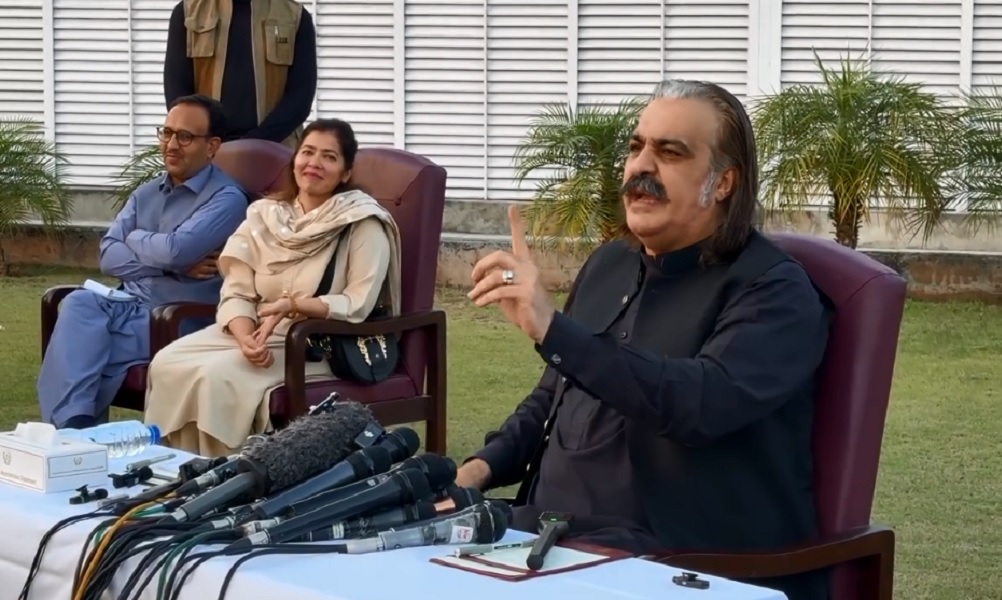
Amid rising tensions over Pakistan’s repatriation plans for illegal Afghan nationals, Khyber Pakhtunkhwa Chief Minister Ali Amin Gandapour said on Friday that no refugees will be forcibly deported from the province.
“We will not allow any Afghan refugee to be expelled by force from Khyber Pakhtunkhwa. We stand firmly against such inhumane deportations,” Gandapur said at a press conference.
The remarks came as the Pakistani government ramps up efforts to repatriate undocumented Afghan refugees and Afghan Citizen Card (ACC) holders, following the expiration of the voluntary return deadline on March 31, 2025.
“The past situation, where Afghan refugees, including women and children, were stranded at the border, tarnished Pakistan’s image,” Gandapur said, reaffirming the provincial government’s commitment to a dignified repatriation process.
“We are setting up camps for voluntary repatriation, and anyone wishing to return will be helped. However, we will not forcibly expel any Afghan refugee,” he stated.
Afghans holding Afghan Citizen Cards (ACC) — issued by Pakistan authorities and held by 800,000 people, according to the United Nations — face deportation to Afghanistan after the deadline.
More than 1.3 million Afghans who hold Proof of Registration (PoR) cards from the UN refugee agency, UNHCR, are also to be moved outside the capital Islamabad and neighbouring city Rawalpindi.
Latest News
IEA has 46 township plans for returnees, minister tells visiting Iranian official
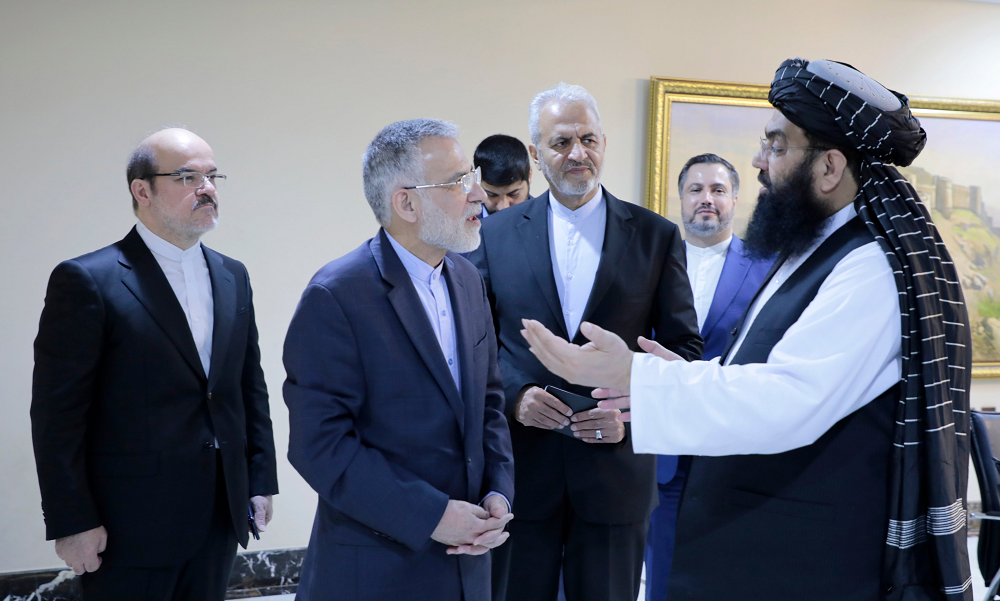
The Islamic Emirate of Afghanistan (IEA) has 46 township plans for returning refugees, Acting Minister of Refugees and Repatriation Mawlawi Abdul Kabir told a visiting Iranian diplomat in Kabul, calling on Tehran to give refugees time to return.
According to a statement issued by the ministry on Saturday, Abdul Kabir said during the meeting that Afghanistan and Iran are friendly neighbors that have many commonalities.
He stressed the need to further develop and strengthen relations between the two countries and said that the frequent visits of high-ranking Iranian officials show that Tehran wants positive and friendly relations with Afghanistan.
Abdul Kabir thanked Iran for its assistance and hosting of Afghan refugees, saying that Iran and Pakistan have been hosting Afghan refugees for the past few decades. He called for more leniency in the treatment of migrants.
He said that the Islamic Emirate is preparing a mechanism to provide legal documents for those migrants whose legal residence in Iran has expired.
In the meeting, Mohammad Reza Bahrami, Iran’s new Assistant Minister and Director General for South Asian Affairs at the Foreign Ministry, invited Abdul Kabir to visit Tehran, and called for repatriation plan to be shared before the trip.
He stressed on the humane treatment of Afghan refugees and appreciated the Islamic Emirate’s initiative to build 46 townships, calling it an important step forward for the return of refugees.
Bahrami noted that there are currently eight million Afghan reguees living in Iran, of whom four million are undocumented or have their residence expired.
-

 Latest News4 days ago
Latest News4 days agoAfghanistan’s reconstruction is in the interest of EU: Uzbek president
-

 Latest News4 days ago
Latest News4 days agoUS won’t rest until all Americans detained in Afghanistan brought home: Rubio
-

 Latest News3 days ago
Latest News3 days agoMinistry of Economy calls on US to release Afghanistan’s frozen funds
-

 Latest News4 days ago
Latest News4 days agoBulgaria brings five people to trial over deaths of 18 Afghan migrants
-

 Latest News3 days ago
Latest News3 days agoPakistan ‘extends’ deadline for a week for Afghans to leave the country
-

 Regional5 days ago
Regional5 days agoChina launches military drills around Taiwan, calls its president a ‘parasite’
-

 Business4 days ago
Business4 days agoGold climbs to record high as tariff worries bolster safe-haven demand
-

 Sport3 days ago
Sport3 days agoIPL 2025: Batters in race for prestigious Orange Cap


